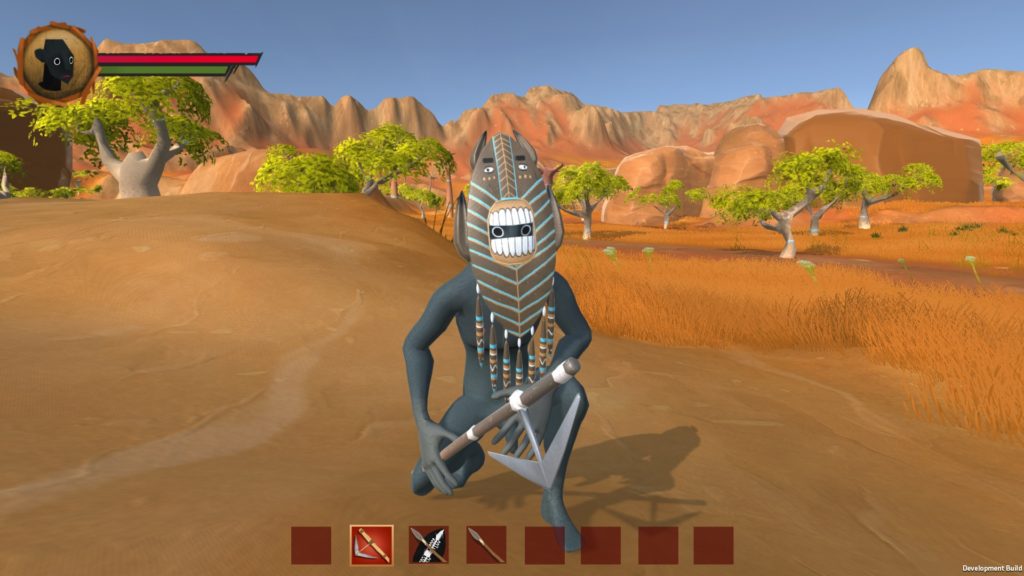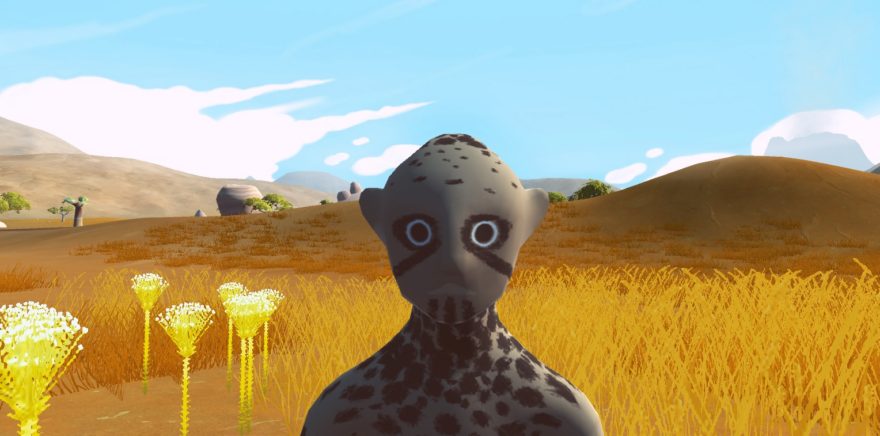Where and when is the “fantasy primitive africa” of upcoming survival game Voodoo? “You will be one of the founders of civilization,” says Brain in the Box, the Italian studio behind it. Bear in mind that the first humans popped up in East Africa around 250,000 thousand years ago, and civilization has its roots in Mesopotamia and Egypt around 14,000 years ago—not much fantasy there.
The trailer for the game also includes the bow and arrow, metal tools, and tribal masks. Having these all in the same place is a collapsing of time that we haven’t had written history long enough to be able to adequately describe with figures or events. The map is a similar collapsing of space, with the jungle, the volcano, and the savanna all squished right up against the desert.
Brain in a Box are right on one account, though: Africa is a “poorly used setting in videogames,” but not because it’s used infrequently. Democracy 3: Africa let you govern a handful specific countries from Tunisia to South Africa. Far Cry 2 (2008) takes place in a fictional Central African country with a failed government and a couple of revolutionary groups in control. You go to Africa the continent-country in Resident Evil 5 (2009), and mow down black-skinned zombies. Africa is a “poorly used setting in videogames” because it’s too often a heavily-abstracted backdrop of conflict for expansion packs and ill-advised sequels.
Oft-paired with pirates and ninjas, the stereotypical “African tribesman” is a mishmash of images from mostly Eastern African Masaai and Zulu traditions. In Voodoo, we see oval shields with horizontal bars—lifted from Zulu shields in documented use in the 18th and 19th centuries—and then the use of the word “voodoo” is tied up in traditions associated with the African Diaspora. “Vodun” in West Africa isn’t quite the same as the traditions that were popular in communities of slaves brought to the Caribbean and North America. “Voodoo” in Louisiana isn’t quite the same as “vodou” in Haiti, either. The characters in the trailer look less like stylized people and more like animals, crouched over with wide eyes and elephant trunk penises. The face next to the health indicator bears the bright red lips associated with offensive caricatures understood globally.
This picking and choosing out of religions and cultures and offensive imagery strips people and builds out of them an aesthetic. Africa is compressed, and specific cultures are kneaded into “fantasy primitive africa.” When stereotyping like this gets ingrained, it gives us a pass—an excuse not to think more deeply about drone strikes in Somalia, or to dismiss civil war in Sudan as tribal scuffle, or to think refugees are loincloth-wearing hut-dwellers.
But Voodoo is just a game, of course, and it’s fantasy africa, not real Africa. It bears no relation to the real world, except that it’s eerily similar to harmful played-out stereotypes. It’s ostensibly set in a real place at a real time, but it only reflects that superficially. At GDC 2015, Ben Esposito gave a talk called “not my story” about his upcoming game Donut County, and the process by which he realized that repurposing other cultures into an aesthetic for his project could be problem. It’s why Donut County now has a story that’s relevant to Esposito’s life, and that he’s already an expert at telling.

There is a moment in the trailer for Voodoo where it really looks like that old PS2 tech demo for Nico—the game that eventually became Shadow of the Colossus (2005). But Team Ico’s games don’t layer fantasy on top of tasty ideas plucked from their contexts in cultures that already exist. The Forbidden Land of Shadow of the Colossus is designed—its language, its history, its culture are defined by Team Ico, and aren’t made out of tired stereotypes about specific people or places. In fact, part of what enables the world of Shadow of the Colossus to inspire so much awe is that its ruins and tablets point to a rich history that we know we know too little about.
Maybe that’s something for the creators of Voodoo to take on board. You know, just, maybe.
You can find out more about Voodoo over on its website.


